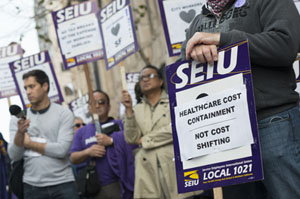SACRAMENTO – A California health care workers’ union is collecting signatures to get two measures onto the ballot that it says would lower health care costs.
United Health Care Workers West, or SEIU-UHW, wants to cap what hospitals can charge to 25 percent above the actual cost of services. SEIU-UHW says on average, hospitals charge 320 percent above the cost of care.
The union also wants to cap CEO salaries at nonprofit hospitals to $450,000 a year.
“These two [initiatives] in combination will do more to bring down the cost of health care than anything else that’s been considered recently in California or anyplace else,” says SEIU-UHW President Dave Regan.
He says hospitals are the biggest driver in health care spending.
“There’s a culture of pricing, and a culture of doing business that has just lent itself to driving the cost of care up,” says Regan.
But the California Hospital Association (CHA) says nobody actually pays the full amount that hospitals charge. Instead, insurers pay negotiated rates that vary, Medicare pays a price it sets, and Medi-Cal, as Medicaid is known in California, pays yet another rate. Medi-Cal’s rates are among the lowest rates paid to hospitals in the country.
The hospital association says capping charges would cut $12 billion annually from hospital revenues statewide, forcing cutbacks in staff and services.
“These are very dangerous and deceptive initiatives because they don’t get at the underlying causes of why health care costs rise,” says Jan Emerson Shea, vice president of external affairs at CHA.
She adds that the CEO salaries are justified.
“Running a hospital is the most complex business to run today…Essentially you’re running a city,” she says.
California-based health systems Kaiser Permanente and Dignity Health had two of the highest CEO salaries for nonprofit systems in the country, according to an analysis of tax files by Kaiser Health News. (KHN is not affiliated with Kaiser Permanente.) Former Kaiser Permanente CEO George Halvorson made $7.9 million in 2011. Dignity Health CEO Lloyd Dean made $5.1 million in 2010.
Health economist Dylan Roby at UCLA’s Center for Health Policy Research says the ballot proposals are an indirect way of putting price pressure on hospitals.
Roby says what hospitals charge is not the same as what they get paid. That’s partly because private insurers typically negotiate prices down, which means hospitals usually bring in less than 25 percent above the actual cost of care.
“Putting 25 percent [as] the upward bound is somewhat meaningless,” says Roby. “[That threshold is] still a little bit higher than a typical insurer is paying. It’s higher than Medicare is paying, and it’s certainly higher than Medi-Cal is paying.”
But Roby says capping what hospitals charge would protect uninsured and underinsured people from being overcharged for a service. He also says it could help bring more transparency to health care pricing.
When it comes to capping CEO pay at nonprofit hospitals, Roby says such a law would not necessarily save the health care system money.
He says the national average for the CEO salary at a nonprofit hospital is about $600,000 a year. But if CEO pay is cut, hospitals might spend the savings to shift the work load somewhere else.
“The CEO’s not going to say, ‘Well I’m going to continue doing the same exact amount of work for that $450,000,’” says Roby.
Seventeen Democratic California lawmakers have endorsed the ballot measures. The union expects to finish gathering the necessary 565,000 signatures by the middle of April, to meet a deadline to get the proposals on the November ballot.
This story is part of a reporting partnership that includes Capital Public Radio, NPR and Kaiser Health News. Blue Shield of California Foundation helps support KHN coverage of California.







